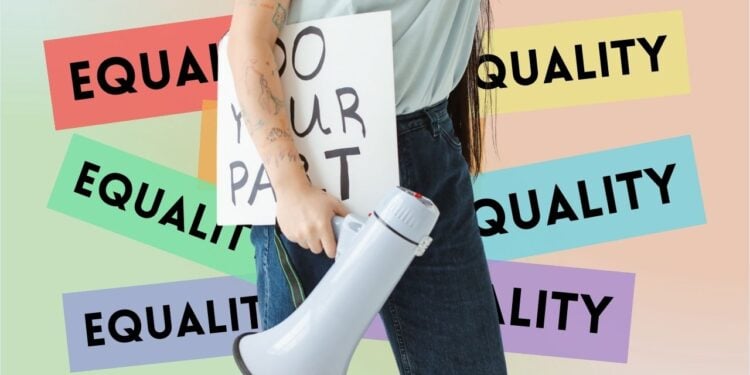- According to a Kantar study, 68% of US consumers expect brands to be clear about their values.
- Companies and brands have increasingly endorsed diversity movements, months and campaigns, such as the BLM movement, gay pride month, and black history month.
- If marginalized groups become more accepted by society, and even celebrated – this brings new and exciting opportunities for the future of the workforce and the future of work in general.
Diversity is important, but many companies are asking: Is it profitable?
The answer is overwhelmingly “YES.”
Although often political, supporting a movement that is in the best interest of diversity is beneficial for those in our society who are marginalized. It’s also no secret that this also brings in a nice profit for the companies that show their support.
The question is, does this detract from the movement towards diversity?
Why do companies show their support for diversity and social movements?
According to a Kantar study, 68% of US consumers expect brands to be clear about their values, while Millennials and Gen Z have the highest expectations of all age groups.
Kantar’s 2021 Media Trends and Predictions report offers a word of caution though, as inauthenticity in this area can alienate consumers.
Companies and brands have increasingly endorsed diversity movements, months and campaigns, such as the BLM movement, gay pride month, and black history month.
Most large companies show their support for the LBGTQ community once June 1st hits (gay pride month) by rebranding their corporate social media profiles to feature rainbow-colored logos, cover photos, products, and entire rainbow-themed campaigns in tribute to the Pride flag.
But we have to ask what exactly do these organizations and brands support. More importantly, what happens to the money consumers spend with these companies? Does brand support have any real impact, or is it just PR?
Pride and profit might be getting mixed.
Is company support of social and diversity movements just PR?
In most cases, it is best to assume that companies want to profit from hot topics, political issues, and social movements. Consumers care about the values of the organizations that they support, and organizations care about making money.
The soda company Pepsi is a prime example of a brand that jumped on a social issue and failed. In 2017, the company faced massive backlash over an ad that appeared to trivialize the Black Lives Matter movement.
While Pepsi hugely missed the mark, it seems staying silent can also be damaging to brands – particularly when it comes to the issue of racial injustice.
Of course, there are many companies and brands that truly support BLM, Pride, etc., but it can sometimes be hard to distinguish.
One study has found that 25 companies that have shown support for gay pride have donated more than $10m to anti-LGBTQ federal and state politicians over the past few years.
The study found that alongside pronouncements of LGBTQ support, corporations including CVS, AT&T, Walmart and Comcast have supported candidates who seek to block or otherwise restrict equal rights based on gender or sexual orientation.
Unfortunately, much of the proclaimed company support of diversity and acceptance movements is false, as well as hypocritical.
What should the criteria be for supporting diversity movements?
Entities, brands and companies alike should ask themselves what their motivation is when openly showing support or creating diversity/pride themed products and campaigns. If it is simply to cash in on the profitability of these causes, then consumers will catch on, and it will backfire for organizations.
The problem with commodifying awareness is that it’s unclear whether it serves to raise money for charitable causes; there’s no guarantee that money will result in any sort of beneficial social outcome. Companies are largely receiving the funds from their endorsement of diversity and human rights movements.
Company support in the name of suffrage, diversity and human rights can and should be expressed sincerely, and without the goal of monetary gain.
Diversity doesn’t need to be profitable.
Why should companies actually invest in diversity?
The intrusion of organizations into social movements is here to stay, but if done correctly, it can be beneficial for all.
From a business standpoint, it’s smart to understand and cater to the desires of consumers. People want to support brands that they feel supported by. And if these companies actually create inclusivity programs or hire workers from marginalized groups – that’s even better.
From a social standpoint, it’s morally right to be inclusive. Society is becoming more homogenous and diverse and it must be embraced, and those who do not embrace it will fail.
The future of work is bringing opportunities for us all
The reality of the matter is that whether insincere or not, company support of diversity movements helps to bring more awareness and acceptance.
If marginalized groups become more accepted by society, and even celebrated – this brings new and exciting opportunities for the future of the workforce and the future of work in general.
By endorsing these movements as well as hiring people from diverse groups, entities are showing that they intend to take a stand for those who have not previously been considered a crucial part of society and the workforce.



 Dr. Gleb Tsipursky – The Office Whisperer
Dr. Gleb Tsipursky – The Office Whisperer Nirit Cohen – WorkFutures
Nirit Cohen – WorkFutures Angela Howard – Culture Expert
Angela Howard – Culture Expert Drew Jones – Design & Innovation
Drew Jones – Design & Innovation Jonathan Price – CRE & Flex Expert
Jonathan Price – CRE & Flex Expert












